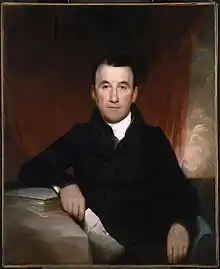Jonas Platt | |
|---|---|
 Portrait of Platt, by Samuel F. B. Morse, 1828 | |
| Member of the New York State Senate | |
| In office July 1, 1809 – June 30, 1813 | |
| Member of the U.S. House of Representatives from New York's 9th district | |
| In office March 4, 1799 – March 3, 1801 | |
| Preceded by | John Williams |
| Succeeded by | Benjamin Walker |
| Member of the New York State Assembly | |
| In office July 1, 1795 – June 30, 1796 | |
| Personal details | |
| Born | June 30, 1769 Poughkeepsie, Province of New York, British America |
| Died | February 22, 1834 (aged 64) Peru, New York, United States |
| Political party | Federalist |
| Spouse | Helena Livingston |
| Relations | Charles Z. Platt (brother) |
| Children | 8, including Zephaniah |
| Parent(s) | Zephaniah Platt Mary Van Wyck Platt |
Jonas Platt (June 30, 1769 – February 22, 1834) was an American lawyer and politician from New York. He was a member of the United States House of Representatives.[1]
Early life
Platt was born on June 30, 1769, in Poughkeepsie, Province of New York, in what was then British America.[2] He was the son of politician and lawyer Zephaniah Platt (1735–1807), who founded Plattsburgh, New York, and his second wife, Mary Van Wyck Platt (1742–1809). Among his siblings was New York State Treasurer Charles Z. Platt.[3]
He attended a French Academy at Montreal, Quebec, studied law, and was admitted to the bar in 1790.[1]
Career
He practiced law in Poughkeepsie and served as the county clerk of Herkimer County, New York, from 1791 to 1798. He was also the county clerk of Oneida County, New York, from 1798 to 1802. He was a member of the New York State Assembly in 1796.[1]
Platt was elected as a Federalist to the Sixth Congress, and served from March 4, 1799, to March 3, 1801. He was the chairman of the United States House Committee on Revisal and Unfinished Business. Afterward, he resumed the practice of law and served as a general in the Cavalry in the New York State Militia. In 1810, he was an unsuccessful candidate for governor. He was a member of the New York State Senate from 1809 to 1813. He was also a member of the Council of Appointment in 1813.[1]
From 1814 to 1821, Platt was an associate justice of the New York Supreme Court. He was a delegate to the New York Constitutional Convention in 1821.[1]
Personal life
He married Helena Livingston (1767–1859), the daughter of Dr. Henry Livingston and Susannah Storm (née Conklin) Livingston, of the Livingston family.[4] She was also the sister of Continental Congressman Gilbert Livingston, the Rev. Dr. John Henry Livingston, president of Queen's College, and author Henry Livingston Jr. (the grandfather of U.S. Senator Sidney Breese and Admiral Samuel Livingston Breese), among others.[4] Together, Jonas and Helena were the parents of eight children, including:[4]
- Susan Jonasse Platt (1793–1843), who married Richard Ray Lansing (d. 1855).[3]
- Zephaniah Platt (1796–1871), the Michigan Attorney General.[3]
- Helen Livingston Platt (1798–1876), who married Truman Parmelee (1801–1845).[5] After his death, she married Dr. Henry W. Bell.[3]
Platt died on February 22, 1834, in Peru, Clinton County, New York. He was buried at the Riverside Cemetery in Plattsburgh.[1]
References
- 1 2 3 4 5 6 "PLATT, Jonas - Biographical Information". bioguide.congress.gov. Biographical Directory of the United States Congress. Retrieved 5 July 2018.
- ↑ "Jonas Platt | Associate Justice of the New York Supreme Court of Judicature, 1814-1823". www.nycourts.gov. New York Courts. Retrieved 15 April 2019.
- 1 2 3 4 Platt, George Lewis (1891). The Platt Lineage: A Genealogical Research and Record. T. Whittaker. p. 124. Retrieved 12 April 2019.
- 1 2 3 Livingston, Edwin Brockholst (1910). The Livingstons of Livingston Manor: Being the History of that Branch of the Scottish House of Callendar which Settled in the English Province of New York During the Reign of Charles the Second; and Also Including an Account of Robert Livingston of Albany, "The Nephew," a Settler in the Same Province and His Principal Descendants. Knickerbocker Press. Retrieved July 5, 2018.
- ↑ "Col. Theodore Weld Parmele" (PDF). The New York Times. 15 May 1893. Retrieved 15 April 2019.
External links
- United States Congress. "Jonas Platt (id: P000381)". Biographical Directory of the United States Congress.
- Jonas Platt at Find a Grave
- Livingston family tree